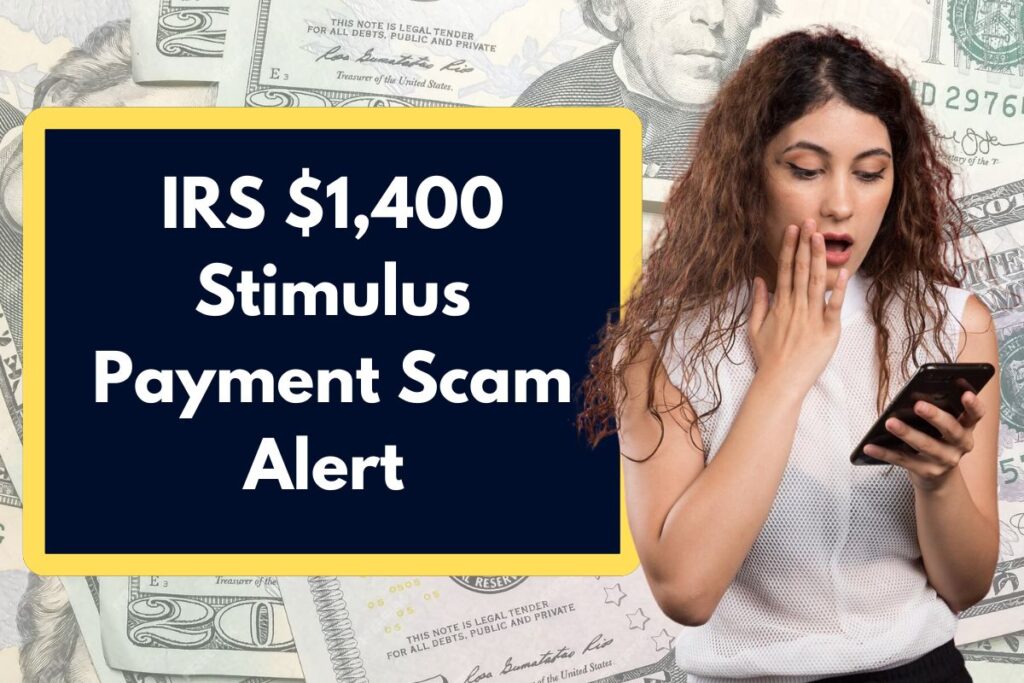Many Americans are experiencing great financial hardship due to inflation and the growing cost of life. However, the Internal Revenue Service (IRS) will provide special payments of up to $1,400 to help around one million taxpayers, who will get a refundable credit. Eligible taxpayers who failed to claim RRC on their 2021 tax return will get IRS $1,400 Stimulus Payment 2025.
The Covid-19 stimulus payments are included in this credit. Experts have warns of a scam to take advantage of this refund, stating that scammers pose as IRS employees and send text messages requesting taxpayers’ personal information in exchange for the promise of making the $1,400 Economic Impact Payment.
IRS $1,400 Stimulus Payment Scam Alert
To fool people into divulging personal information, scammers are posing as the IRS and saying they qualify for a $1,400 stimulus payout. These fraudulent messages may appear authentic, but they are actually a phishing scam meant to steal your private information. IRS has declared that qualified taxpayers who failed to claim RRC on their 2021 tax forms will get this payment. In coming days these payments will be shared and do not require any action from taxpayers. Additionally, a letter from the IRS verifying the payment would be sent to eligible persons. Only taxpayers who submitted a 2021 tax return but failed to collect the credit to which they were eligible are subject to this procedure.
While citizens wait for stimulus money, fraudsters are posing as the IRS and sending out fraudulent SMS messages. Phishers impersonating the IRS claim that you qualify for the $1,400 Economic Impact Payment and direct you to submit personal data through the provided link. Once more, clicking on the link will take you to fake IRS websites that are intended to steal all of your personal data.
How the scam works?
A SMS message looks to be from the IRS and it says you should give your personal information and that you are eligible for a $1,400 Economic Impact Payment. The scammers says that within one to two business days, the money would be sent to your account or mailed as a check. This communication from the IRS is a phishing hoax. A fake link in the letter imitates an official IRS website. If you click on it, spyware or a bogus form requesting money or personal information may appear.
The IRS never contacts taxpayers by social media, email, or text, and they never ask for information in this manner. Phishing text messages are an internet scam that impersonates an official source, and scammers may be using them more frequently during the tax season, that started on January 27 and ends by April 15.

Is the IRS $1,400 payment real?
Yes, it is. In late 2024, the IRS announced that it would be disbursing up to $1,400 in Economic Impact Payments (also known as COVID-19 stimulus payments) to those who had never received them before. Most of the payments should be in coming days, the IRS said. Those who are eligible for the payout can get it without doing anything.
Many eligible individuals filed their tax returns but failed to claim RRC, according to EIP, that was disbursed in three waves by the IRS and the U.S. Department of the Treasury. The IRS claims that since qualified taxpayers have already been recognized in the system, they will not need to do anything to get the refund. For some, the payment has already been sent directly into the bank account linked to their 2023 tax return.
How to protect yourself from IRS scams?
Sometimes the scammer calls, emails, texts, or posts on social media to pose as an employee of a government agency, like the IRS, and asks for personal information, like a Social Security number, so to process or even expedite the dispatch of the check and request a money advance to send it.
Another way they have attempted to fool is by sending an email with a link that asks the recipient to provide personal information in order to confirm their identification and subsequently get the Economic Impact Payment. The goal of what is known as phishing is to get the individual’s critical information. There are fraudsters who have mailed bogus checks that look like IRS checks but are larger than the government-determined amounts. The victims are supposed to cash the checks and then return the additional’ amount.
- Never click on buttons or links from unidentified sources. To find out if you qualify for the program, you should instead go to the IRS’s official website.
- Always verify that the online address is the correct IRS URL, which should be irs.gov.
- Before acting, make sure anything is legitimate if you are unsure whether it is a fraud.
How to avoid this scam?
- Check communications: Real IRS notices are not shared by email or SMS; they are conveyed via postal mail.
- Never click on links in unsolicited messages. For information instead, visit irs.gov.
- Beware of urgency: Scammers exploit a sense of urgency to get you to act right away. Invest some time in independently confirming claims.
- Report scams: Report questionable communications and forward them to phishing@irs.gov.
| Official Website | Click Here |
| Homepage | KeralaCoBank.Com |
Samarth Choudhary is a Chief Editor at keralacobank.com. He has overall editorial experience of 10 years in online media. He has completed his graduation from University of California and masters in Finance from University of Dallas in year 2010. His major interest and expertise is in Finance, Taxes, Government Aid and Schemes. His Major focus is to help users to get relevant information which are published on keralacobank.com in easy and precise form.

